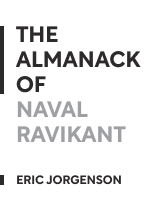

This article is an excerpt from the Shortform book guide to "The Almanack of Naval Ravikant" by Eric Jorgenson. Shortform has the world's best summaries and analyses of books you should be reading.
Like this article? Sign up for a free trial here .
What is the difference between money and wealth? Which one should be your focus?
Typically, we understand wealth to be the same as net worth, the sum of your assets. However, entrepreneur and self-made millionaire Naval Ravikant sees wealth a bit differently. The Almanack of Naval Ravikant shares his definition of wealth and how he distinguishes it from money. Then, it explains why Ravikant believes you should focus on generating wealth rather than money.
Keep reading to learn about this way of looking at money and wealth.
Focus on Building Wealth, Not Money
What is the difference between money and wealth? To Naval Ravikant, wealth is owning assets that grow over time without further input from you. Money, by contrast, is merely the means of distributing wealth and time. The equity you own in a growing landscaping company is wealth; the cash people pay you for mowing their lawn is money. According to Ravikant, it’s more important to focus on generating wealth than on generating money.
(Shortform note: Ravikant’s definition of wealth differs from the standard understanding of the concept. Wealth is typically understood as net worth: The sum of your assets, such as your savings and your investment accounts, minus your liabilities, such as your mortgage and student loans. Owning assets that grow over time could be considered a part of your wealth according to this definition, but it doesn’t encompass all that wealth is.)
To Ravikant, the best measure of wealth is financial freedom. When you achieve financial freedom, you have enough income or assets to cover your expenses for the rest of your life without ever having to work. This, to Ravikant, is why you should pursue wealth: By reaching financial freedom, you can spend your time as you please.
(Shortform note: Although Ravikant says true wealth means financial freedom for the rest of your life, other financial experts note that you can aim for financial freedom for a shorter period of time. Financial freedom is merely having enough net worth to cover your expenses for a given amount of time. As a measure of wealth, then, some financial experts suggest that financial freedom should be measured in years, not money. That is, by dividing your net worth by your annual expenditures, you can figure out how many years of financial freedom you have.)

———End of Preview———
Like what you just read? Read the rest of the world's best book summary and analysis of Eric Jorgenson's "The Almanack of Naval Ravikant" at Shortform .
Here's what you'll find in our full The Almanack of Naval Ravikant summary :
- Millionaire Naval Ravikant's advice on how to build wealth and happiness
- The three types of leverage you'll need to become successful
- The habits to adopt that will lead to happiness






